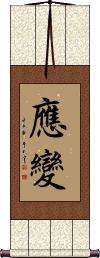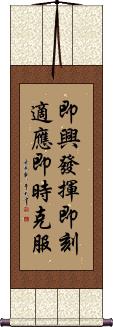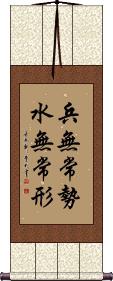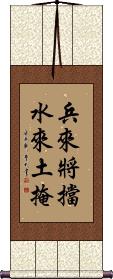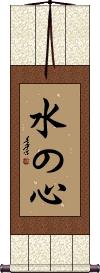Many custom options...
And formats...

Ability to Adapt in Chinese / Japanese...
Buy an Ability to Adapt calligraphy wall scroll here!
Personalize your custom “Ability to Adapt” project by clicking the button next to your favorite “Ability to Adapt” title below...
Ability to Adapt
Adapt Oneself
應變 means “to meet a contingency,” “to adapt oneself to changes,” or “to adapt to changes” in Chinese.
It's also used in Japanese but usually only in the context of Buddhism. 應變 is probably the shortest way to express the idea of adapting and overcoming whatever circumstances present themselves.
Improvise Adapt Overcome
即興發揮即刻適應即時克服 is the coolest way to put together this famous word list, “Improvise Adapt Overcome.”
There are shorter ways to write “adapt,” and “overcome,” but “improvise” needs a four-character word to be expressed accurately in Chinese. To match them up, the other two are using four-character words as well. This makes it sound more natural in Chinese (though word lists are not a natural construct in Chinese grammar).
The words break down like this: 即興發揮, 即刻適應, 即時克服. I suggest the 3-column option when you customize your wall scroll. That way, the words will occupy one column each.
A great gift for a U.S. Marine, or anyone who follows this mantra.
Warriors Adapt and Overcome
Soldiers need a fluid plan
This literally translates as: Troops/soldiers/warriors have no fixed [battlefield] strategy [just as] water has no constant shape [but adapts itself to whatever container it is in].
Figuratively, this means: One should seek to find whatever strategy or method is best suited to resolving each individual problem.
This proverb is about as close as you can get to the military idea of “adapt improvise overcome.” 兵無常勢水無常形 is the best way to express that idea in both an ancient way, and a very natural way in Chinese.
Soldiers Adapt Actions to the Situation
This Chinese military proverb means, counter soldiers with arms and counter water with an earthen dam.
兵來將擋水來土掩 is about how different situations call for different actions. You must adopt measures appropriate to the actual situation.
To explain the actual proverb, one would not attack a flood of water with gunfire, nor would you counter-attack soldiers by building an earth weir. You must be adaptable and counter whatever threatens with relevant action.
Mind Like Water
Mizu No Kokoro
水の心 is the Japanese Buddhist and martial arts phrase, “Mizu no Kokoro,” which means “mind like water” or “heart of water.”
The phrase is a metaphor describing the pond that clearly reflects its surroundings when calm but whose images are obscured once a pebble is dropped into its waters.
Not the results for ability to adapt that you were looking for?
Below are some entries from our dictionary that may match your ability to adapt search...
| Characters If shown, 2nd row is Simp. Chinese |
Pronunciation Romanization |
Simple Dictionary Definition |
応変能力 see styles |
ouhennouryoku / ohennoryoku おうへんのうりょく |
More info & calligraphy: Ability to Adapt |
應變 应变 see styles |
yìng biàn ying4 bian4 ying pien ōhen |
More info & calligraphy: Adapt Oneselfadapt to changes |
將錯就錯 将错就错 see styles |
jiāng cuò jiù cuò jiang1 cuo4 jiu4 cuo4 chiang ts`o chiu ts`o chiang tso chiu tso |
More info & calligraphy: Accept Your Mistake and Move On |
化用 see styles |
huà yòng hua4 yong4 hua yung keyū |
to adapt (an idea etc) transformative workings |
因應 因应 see styles |
yīn yìng yin1 ying4 yin ying |
to respond accordingly to; to adapt to; to cope with |
改成 see styles |
gǎi chéng gai3 cheng2 kai ch`eng kai cheng |
to convert; to turn into (something else); to adapt (a story to another medium) |
改編 改编 see styles |
gǎi biān gai3 bian1 kai pien kaihen かいへん |
to adapt; to rearrange; to revise (noun, transitive verb) reorganization; reorganisation |
燮理 see styles |
xiè lǐ xie4 li3 hsieh li |
to harmonize; to adapt; to adjust |
移用 see styles |
yí yòng yi2 yong4 i yung iyou / iyo いよう |
to use (something) for a purpose other than its original one; to adapt (tools, methods etc) for another purpose (noun, transitive verb) transfer of a budget appropriation from one (government) section to another |
翻拍 see styles |
fān pāi fan1 pai1 fan p`ai fan pai |
to make a photographic reproduction of an image or document etc; a reproduction; to remake a movie or TV series; a remake; to adapt (a novel etc) as a movie; an adaptation |
調適 调适 see styles |
tiáo shì tiao2 shi4 t`iao shih tiao shih jōjaku |
to adapt (to an environment etc); to make something suitable; adaptation; adjustment; adaptive adjust |
轉用 转用 see styles |
zhuǎn yòng zhuan3 yong4 chuan yung |
to adapt for use for another purpose |
適化 适化 see styles |
shì huà shi4 hua4 shih hua tekika |
To adapt teaching to circumstances. |
適應 适应 see styles |
shì yìng shi4 ying4 shih ying |
to adapt; to fit; to suit |
遷就 迁就 see styles |
qiān jiù qian1 jiu4 ch`ien chiu chien chiu |
to yield to; to adapt to; to accommodate oneself to (something) |
順化 顺化 see styles |
shùn huà shun4 hua4 shun hua junka じゅんか |
Hue, city in central Vietnam and capital of Thua Thien province (noun/participle) acclimatization; naturalization; acclimation; (place-name) Junka To accord with one's lessons; to follow the custom; to die. |
順應 顺应 see styles |
shùn yìng shun4 ying4 shun ying jun'ō |
to comply with; to conform to; to adapt to; to go along with; in tune with to accord with |
溶込む see styles |
tokekomu とけこむ |
(v5m,vi) (1) to melt into; to merge into; (2) to fit in; to adapt; to blend |
解込む see styles |
tokekomu とけこむ |
(v5m,vi) (1) to melt into; to merge into; (2) to fit in; to adapt; to blend |
識時務 识时务 see styles |
shí shí wù shi2 shi2 wu4 shih shih wu |
to have a clear view of things; to adapt to circumstances |
適応力 see styles |
tekiouryoku / tekioryoku てきおうりょく |
adaptability; capacity to adapt; ability to adjust |
馴染む see styles |
najimu なじむ |
(v5m,vi) (1) to become familiar with; to get used to; to become accustomed to; to adapt oneself to; to become attached to; to become friendly with; (v5m,vi) (2) to come to fit; to go (well) with; to suit; to match; to harmonize (with); to blend in (with); to agree with (e.g. one's skin) |
アダプト see styles |
adaputo アダプト |
(noun or participle which takes the aux. verb suru) to adapt |
とけ込む see styles |
tokekomu とけこむ |
(v5m,vi) (1) to melt into; to merge into; (2) to fit in; to adapt; to blend |
不識時務 不识时务 see styles |
bù shí shí wù bu4 shi2 shi2 wu4 pu shih shih wu |
to show no understanding of the times (idiom); cannot adapt to current circumstances; not amenable to reason |
不識時變 不识时变 see styles |
bù shí shí biàn bu4 shi2 shi2 bian4 pu shih shih pien |
to show no understanding of the times (idiom); cannot adapt to current circumstances; not amenable to reason |
君子豹変 see styles |
kunshihyouhen / kunshihyohen くんしひょうへん |
(1) (yoji) the wise readily adapt themselves to changed circumstances; the wise are quick to acknowledge their mistakes and correct them; (2) (yoji) (in colloquial usage, ironically or as an excuse) the wise make no scruple in suddenly changing their demeanor |
投其所好 see styles |
tóu qí suǒ hào tou2 qi2 suo3 hao4 t`ou ch`i so hao tou chi so hao |
to adapt to sb's taste; to fit sb's fancy |
泥古不化 see styles |
nì gǔ bù huà ni4 gu3 bu4 hua4 ni ku pu hua |
conservative and unable to adapt (idiom) |
溶けこむ see styles |
tokekomu とけこむ |
(v5m,vi) (1) to melt into; to merge into; (2) to fit in; to adapt; to blend |
Click here for more ability to adapt results from our dictionary
The following table may be helpful for those studying Chinese or Japanese...
| Title | Characters | Romaji (Romanized Japanese) | Various forms of Romanized Chinese | |
| Ability to Adapt | 応変能力 | ouhen nouryoku ouhennouryoku ohen noryoku | ||
| Adapt Oneself | 應變 应变 | ou hen / ouhen / o hen | yìng biàn ying4 bian4 ying bian yingbian | ying pien yingpien |
| Improvise Adapt Overcome | 即興發揮即刻適應即時克服 即兴发挥即刻适应即时克服 | jí xìng fā huī jí kè shì yìng jí shí kè fú ji2 xing4 fa1 hui1 ji2 ke4 shi4 ying4 ji2 shi2 ke4 fu2 ji xing fa hui ji ke shi ying ji shi ke fu | chi hsing fa hui chi k`o shih ying chi shih k`o fu chi hsing fa hui chi ko shih ying chi shih ko fu |
|
| Warriors Adapt and Overcome | 兵無常勢水無常形 兵无常势水无常形 | bīng wú cháng shì shuǐ wú cháng xíng bing1 wu2 chang2 shi4 shui3 wu2 chang2 xing2 bing wu chang shi shui wu chang xing | ping wu ch`ang shih shui wu ch`ang hsing ping wu chang shih shui wu chang hsing |
|
| Soldiers Adapt Actions to the Situation | 兵來將擋水來土掩 兵来将挡水来土掩 | bīng lái jiàng dǎng shuǐ lái tǔ yǎn bing1 lai2 jiang4 dang3 shui3 lai2 tu3 yan3 bing lai jiang dang shui lai tu yan | ping lai chiang tang shui lai t`u yen ping lai chiang tang shui lai tu yen |
|
| Mind Like Water | 水の心 | mizu no kokoro mizunokokoro | ||
| In some entries above you will see that characters have different versions above and below a line. In these cases, the characters above the line are Traditional Chinese, while the ones below are Simplified Chinese. | ||||
Successful Chinese Character and Japanese Kanji calligraphy searches within the last few hours...

